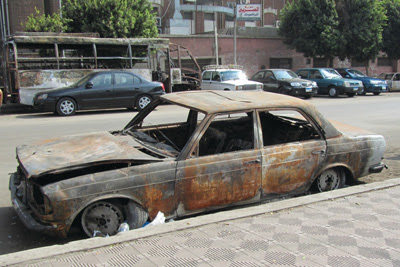Marie-Claude Lalonde is the National Director of Aid to the Church in Need Canada. Here she reports back on her visit to Egypt in October to assess the situation facing Christians in the aftermath of the 25th January Revolution.
For the last year and a half, Egypt has made regular headlines because of clashes between Christians and Muslims. The country also hit front page during the Arab Spring early on this year. The situation of Christians – as well as of other minorities – continues to deteriorate.
Nevertheless, this cannot uniquely be seen as inter-confessional violence, as the roots of these conflicts are often found in the relationships between large families, unfounded rumours, the discriminatory rules of State, political issues, etc.
Despite these sad episodes of violence, life continues with school, work, agriculture, commerce…
In Dairut, a small village situated on the west coast of the Nile and 350 km south of Cairo, the Sisters of Saint Ann – an Italian congregation – hold a dispensary. They treat and counsel their patients without taking notice of their religion. For that matter, the majority of their patients are Muslim women with their children.
250 sick people, sometimes more, present themselves every day, preferring the Sisters’ dispensary to the public hospital. We are told that the care is better and as for the cost? One of the Sisters on site tells us, “They give what they can.”
 |
| A Sister tends to a young patient at the clinic in Dairut, Egypt |
They treat just about anything, but particularly eye infections caused by dust and also many burns. There is a lack of hygiene as well that often delays the healing of wounds.
To the eyes of a stranger, burns are not habitually what come to mind on a list of treatments most frequently dispensed by a medical clinic. One Sister says: “Here, the children run everywhere. They are not careful and fall in fires… or there is boiling water for tea.”
Later on, she continues and explains that an angry man may very well throw boiling water on his spouse or his child. There is a lot of domestic violence. She concludes by saying “Men’s behaviour here is very hard with their women.” That is why, along with treating, the Sisters also educate.
In the cramped areas that serve as examination rooms, and in the hallways, they hang posters about democracy in the home. It’s a way to introduce the subject of relationships between men and women. They also distribute pens with slogans of tolerance inscribed on them: We will grow hand in hand; We are building a future for your son and for mine, etc. They hope that these ideas will do their work.
 |
| Tending to a patient at the clinic in Dairut, Egypt |
As if the task was not already sufficiently large, they go into the streets to find the sick who otherwise would receive no treatment at all. They also lead a campaign against female circumcision in four villages. They tell us it is a reassuring fact to see that the mentality is changing and young couples are no longer doing it.
These three Sisters, and the nurses that help them, represent an element of change and of social stability. Through their attitude and their openness, they show that living together is possible, that democracy has its place and that, most importantly, all people have a right to dignity.


